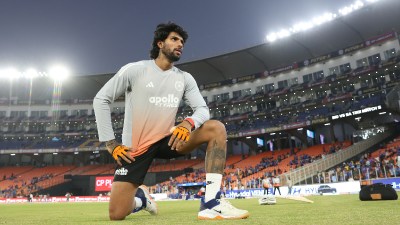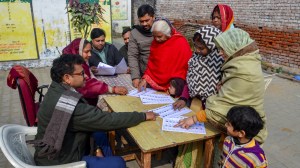Thousands of doctors took to the streets in Rajasthan Monday to protest against the Right to Health Bill, hitting healthcare services across the state. The Indian Medical Association (IMA), the country’s largest physician association, has announced its support to the Rajasthan doctors.

 Doctors stage a protest against Rajasthan’s Right to Health Bill, at Statue Circle in Jaipur. (PTI)
Doctors stage a protest against Rajasthan’s Right to Health Bill, at Statue Circle in Jaipur. (PTI)
Why are the doctors protesting?
The protesters claim that the Bill doesn’t help patients much, but penalises doctors and hospitals.
The most contentious section of the Bill mandates that all hospitals — both public and private — must offer emergency treatment without any prepayment, when required.
IMA national president Dr Sharad Kumar Agarwal, who joined the protest in Rajasthan Monday, said, “Health is the right of every citizen, but providing it is the responsibility of the state government. Because they are incapable of doing so, they are putting it on doctors. We are ready to support the government but we cannot shoulder the entire responsibility. The government spends around Rs 20,000 to Rs 40,000 to run each bed in their hospitals. Who will provide us with this money? The Act does not say who will pay these expenses. We urge the government to take back this draconian Bill.”
The Act does mention that the government will reimburse the hospitals, but the protesters say there is no clarity on how or when these funds will come.
Story continues below this ad
Others claimed the redressal mechanisms mentioned in the Bill will not let doctors work in peace. Moreover, there is still some confusion among a section of doctors, who are citing the old Bill that was sent to the Select Committee.
Dr Amit Yadav, former president of Jaipur Association of Resident Doctors, said: “There are several problems with the Bill. One, when they say hospitals have to provide emergency service, they have not defined what an emergency is. It could range from a heart attack to a delivery to a child coming in with stomach ache in the middle of the night. It will increase bureaucratic challenges in hospitals — determining what is and is not an emergency. Second, it does not define a clear mechanism of reimbursement from the government. And third, it does not say who should treat what. If I run an eye clinic, I cannot treat a heart attack case.”
The Bill, as finally passed in the Assembly, defines emergency in detail, along with adding “… and any other emergency decided by the State Health Authority”. The government has said that more clarification will be provided when the rules for the Bill are framed.
About the redressal mechanism, Yadav said local politicians and government-nominated members would be a part of the district authority to look into patients’ complaints. “If I have a tiff with someone, they can lodge a complaint to impede our functioning. It will just become another machine of corruption. There should be a single state-level redressal authority which also has doctors as their members. How can a politician or an IAS officer take a call on medical procedures?”
Story continues below this ad
The government says this too has been addressed by replacing two nominated members of the government with two IMA members in the State Health Authorities, and the District Health Authorities.
What do public health experts say?
Even as doctors continue their protest, many who have been working to increase access to health services have said that the Bill is a step in the right direction.
Abhay Shukla, national co-convener of Jan Swasthya Abhiyan and one of the people involved in the initial stages of drafting the Bill, said the demand to roll back the Bill because of the clause on emergency treatment is akin to throwing out the baby with the bath water.
“If you read the Bill, 95% of it talks about making the government healthcare systems accountable. Just like MGNREGA made work a right, when health becomes a right, people will be empowered to demand it from the government. This will draw the government’s focus on the gaps in the system,” said Shukla.
Story continues below this ad
He added, “The section on all hospitals being asked to provide emergency care accounts for only 5% of the Bill. Private hospitals too have some responsibility towards people — doctors’ education has been subsidised by taxpayers, sometimes the land for hospitals is subsidised by the government, there are many other subsidies for them. And the government is not saying that they have to treat anyone for free, the mechanisms for reimbursements are likely to be elaborated in the rules.”
He added it was wrong to say that the Bill suggests an eye hospital would be forced to treat a heart attack or accident case, as hospitals will only have to provide “appropriate level of care” as per the Bill. “And no family member will take one suffering a heart attack to an eye hospital!” he added.
Advocate Ashok Agarwal, who has been fighting cases to ensure access to healthcare in Delhi — and is a part of the committee monitoring that private hospitals honour their commitments in land agreements to treat poor patients for free — said, “There is a 1996 Supreme Court judgement that makes it mandatory for all medical practitioners to provide emergency care, without worrying about payments. It should already have been happening. So why are the doctors protesting?”
He added that the Bill will also ensure that those who aren’t able to get healthcare— such as people with rare diseases for which treatments are extremely costly — become the responsibility of the state. “The state then cannot deny them treatment because it will be their right.” He said the Bill was a great step, something no state or central government has been able to do so far.
What are some alternatives?
Story continues below this ad
Delhi has a scheme under which all hospitals are reimbursed for emergency treatment they provide for road traffic accidents, fires, and acid attacks within the territory of Delhi. Shaleen Mitra, who has worked with the Delhi government’s health department, said, “Since there is already a Supreme Court judgement that says hospitals have to provide emergency care, all we did to implement it was to ensure that hospitals get reimbursements.”
He said all stakeholders were brought on board and their issues resolved. The rates were determined — lower at first and then at par with Ayushman Bharat, with added incentives for hospitals accredited with National Accreditation Board for Hospitals & Healthcare Providers — and hospitals asked to not charge the patients anything.
“When a model for providing emergency care already existed in Delhi, a rashly written Bill does not help anyone. It will not help citizens because it will be stuck in litigation, and will also alienate doctors,” said Mitra.



 Doctors stage a protest against Rajasthan’s Right to Health Bill, at Statue Circle in Jaipur. (PTI)
Doctors stage a protest against Rajasthan’s Right to Health Bill, at Statue Circle in Jaipur. (PTI)




































